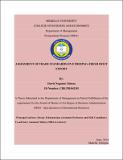| dc.description.abstract | Agriculture is the backbone of Ethiopia's economy and the major source of foreign exchange earnings. Fresh fruit products have been among the most dynamic areas of international agricultural exportable trade. The country has high potential of fresh fruit production and supply for the export market. However, trade standards are becoming a global phenomenon; countries in the developing world face increasing constraints in exporting their products to markets in the developed countries. The Government of Ethiopia is encouraging fresh fruit exports industry as a significant area and the sector has a huge potential for developing an economy. However, its competitiveness is unsatisfactory due to external and internal problems hindering its competitiveness. The aim of this study was to assess the trade in Ethiopia’s fresh fruit export and the effects of trade standard on its fruit export volume to international market. Especially, Ethiopia’s fruit export volume in line with the context of trade standard measurements of fruits. The study was conducted in Koka and Holeta town and their peripheries. Data has been collected from Alemye agricultural investment, Almeta Impex PLC, Holleta Rose PLC and ILAN TOT PLC. The study employed cross sectional survey design and purposive sampling technique. Structured questionnaires (23) and semi structured interview were distributed to respondents and were returned (23). The research is based on the response of samples which have been gathered by primary data (using structured questionnaires and semi-structured interview) from managers and senior experts. Four enumerators were employed for data administration. To analyze the data, descriptive statistical methods such as frequency, percentage, mean, tables, graphs, and different types of charts were used for data generated through questionnaires using SPSS with available versions 16. The result of the study identified that trade standards are barriers for Ethiopia’s fresh fruit export and have significant impact on producers too. Finally, to upgrade the fresh fruit export business, the researcher recommended that there should be due commitment of higher officials in Ethiopian Commodity Exchange and Ministry of Agriculture (fresh fruits quality inspection center) in clarifying the concept of fresh fruit trade standards to producers. Besides, the Ethiopian government specially the Ministry of Trade should put additional effort to come up with different preferential free trade agreements with major international market destinations especially for potential high value export commodities like fresh fruits.
Key words: - Agriculture, Ethiopian fruits, Export, Trade Standard. | en_GB |


